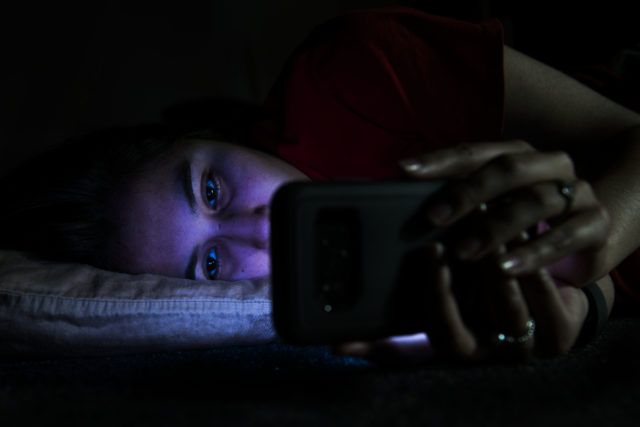If you’ve ever worked late into the night, eyes on a screen instead of the backs of your eyelids, you’re not alone. Our routines can be so jam-packed with working, web surfing, and checking social media that we may struggle to squeeze in the 6-8 hours of nightly slumber recommended by the NHS1.
Luckily, there’s an app for that. Several apps, in fact; and some claim to help combat insomnia through clever alterations to the colours output by your device.
Everyday tasks, such as working at the computer, or watching videos on your phone, expose modern-day night owls to short-wavelength blue light. When we look at blue light, our bodies produce cortisol, a stress hormone that wakes us up. Blue light also inhibits our production of melatonin, the hormone that makes us sleepy2. The effect of blue light is so strong that even a half-hour computer session an hour before bedtime can delay sleep onset by 30 minutes 3. The blue light that you experience during the day causes your body to stay awake, which is convenient if you don’t want to keep dozing off during important tasks. The mechanism falls short, however, when the light comes from your phone screen just before you want to sleep.
Light-filter apps4, such as f.lux, Twilight, and Night Shift, are designed to increase the wavelength of light emitted by phones, tablets, and PCs. As the sun rises, the light from your screen becomes bluer to resemble daylight; as the sun sets, the light becomes redder to reduce your exposure to blue light. These apps claim to give various benefits, from reducing evening hyperactivity in children to protecting your eyes from unspecified dangers. Some light filter apps even have broad, sweeping claims such as improving your overall quality of life.
The efficacy of light-filter apps has yet to be fully understood. Plenty of research suggests that exposure to blue light late at night delays sleep more than exposure to red or orange light. Wearing orange-tinted spectacles in the evening does appear to improve sleep quality. Both spectacles and light-filter apps are able to reduce the amount of blue light experienced by users. Light-filter apps may be less effective than orange-tinted spectacles, as they only affect the colour of the light coming from a screen, and do nothing to prevent blue light from other sources reaching your eyes.
Only one study has directly measured the ability of a light-filter app to promote restful sleep. This study involved only one test subject and was an attempt by the app’s producer to demonstrate that the app performed as advertised5. The study was not scientifically rigorous and so cannot be used to substantiate any claims by the designers. Despite the bold claims made by the apps’ websites, there is no scientific evidence to show that light-filter apps can enhance sleep quality.
But is blue light from screens the real issue here?
One of the most common factors leading to insomnia is poor sleep hygiene. Sleep hygiene consists of a few healthy soporific habits making up a bedtime routine. Winding down before bed can involve having a bath, reading gentle fiction or listening to music, and doing stretching exercises such as yoga. It can involve sex and writing to-do lists, but it should not involve working. Work is usually something we take seriously, and try hard to get right, so it can make us stressed before bed. No matter how orange your screen is, working late is likely to affect your quality of sleep. You are more likely to lie awake, tossing and turning and thinking about work. The light-filter app also only affects light coming from a particular source, and its effects on your sleep hormones are easily cancelled out if there are other blue light sources in the room. Other unhealthy habits, such as drinking caffeinated drinks to help stay awake, will also contribute towards a sleepless night: six hours after drinking a cup of coffee, half the caffeine in that cup will still be in your body.
In theory, using a light-filter app is likely to promote healthy sleep. In practice, the apps may encourage users to develop and maintain unhealthy sleep habits, such as working late. They may be a quick fix for those who have the occasional problem sleeping, but people with ongoing sleep problems should take a good look at their bedtime habits: fewer late nights working and better quality sleep may be far more valuable than the few benefits of staying up late, staring at an orange screen.
This article was specialist edited by Michael Collins and copy-edited by Gemma Donnelly.
References
- https://www.nhs.uk/live-well/sleep-and-tiredness/how-to-get-to-sleep/
- https://www.ncbi.nlm.nih.gov/pmc/articles/PMC2905913/
- https://www.ncbi.nlm.nih.gov/pmc/articles/PMC2831986/
- https://www.lifewire.com/reduce-eye-strain-with-blue-light-filter-apps-4134615
- https://patents.google.com/patent/US9750918B2/en

